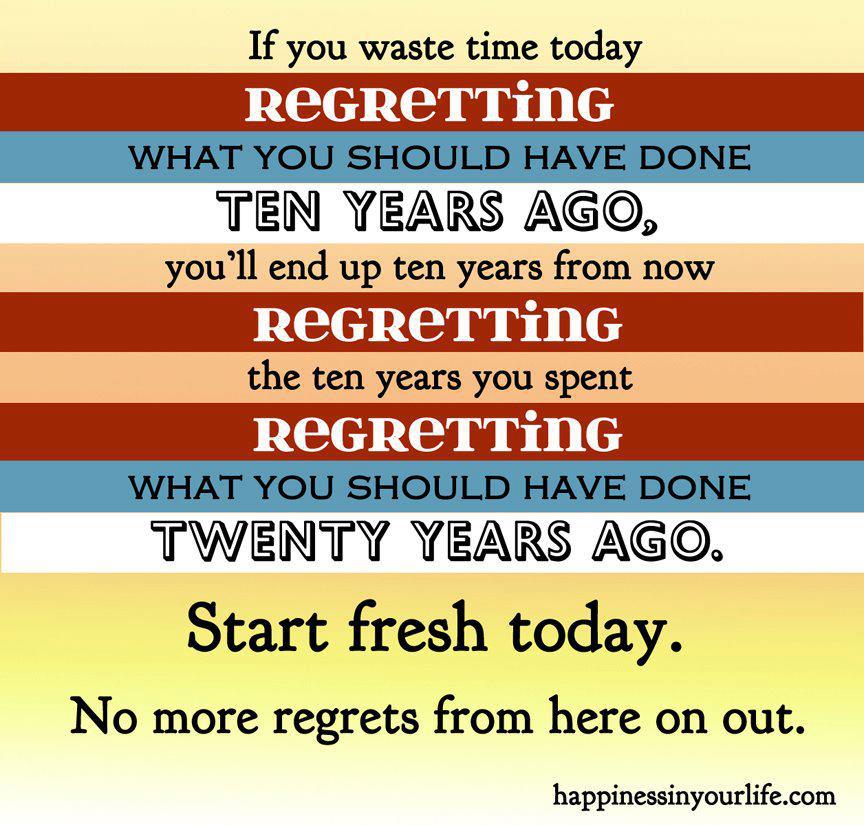Like most people, I have some regrets in life. I regret not doing better in school. I regret not reading more as a child. I regret not reading more as an adult. I regret every lie I have ever told. I regret not telling certain people I loved them before they died. I regret not spending more time with my grandparents. I regret the times I have lost my temper. I regret the times I have lived like a hypocrite. The list goes on and on. If you’re honest, you have your own list too.
For whatever reason, most of us have to learn the hard way. We have to get hurt before we really pay attention. We have to lose something before we truly appreciate what we lost. Too often we have to fall before we can really rise. Life is an effective teacher and sometimes it teaches some unforgiving, painful lessons. Often times, we fail the test and end up in after-school detention.
As I look back at my pile of regrets, it’s easy to let depression sink in. It’s easy to allow negative, self-destructive thoughts to get comfortable in my mind. They like to stretch out their legs, lay on my mental couch, eat a bag of shameful cheetos and talk trash all day long. They enjoy playing back the tape recording of my words. They love to insert the DVD of my actions. They joyfully point to the ticking clock of all the opportunities that I missed. And they know how to pour on the guilt, even better than your Mother.
There are three main problems with their constant verbal assaults. First, they are all true. Every one they mention actually happened on my watch. Second, they are all in the past, a place I can never change. Third and most troubling, I listen to them. They are as familiar to me as any favorite song on the radio. Except the lyrics are poison to my soul. As the landlord of my mind, I need to evict the tenant of regret. Instead, I often refill his drink as I turn up the volume of his accusations.
When I think about each remembered item in the pile, regret is the natural reaction. I would love an opportunity for a “do-over”, a second chance, the ability to “replay the down.” Who wouldn’t? If only we could take back that sentence. If only we could undo that action. If only we could have changed that decision, we’d have one less regret in the pile. As we know all too well, some of those regrets have been costly. Some of those regrets have cost some of us – everything. Regret is especially profound and appropriate when our past actions have affected innocent lives. We should always regret the wrong we have done and the subsequent consequences they have caused.
Having said that, we must not let past regret paralyze our present or negatively affect our future (as much as it is in our control). We cannot let our regrets beat us up for the rest of our lives. Yes, we should accept the responsibility for our actions. But then we should raise our heads high, knowing we have done (or are doing) everything in our power to make right our wrongs. We must look at regret, eyeball to eyeball, recognize our failure, own our specific role, offer the necessary apologies and move it to the pile of “precious.”
 When I think of the word precious, sadly I think of Gollom, the grotesque creature in the Lord of the Rings trilogy. If you are familiar with the story, you know that Gollom is also after the coveted ring. He has a love/hate relationship with it. When it is in his possession, he cradles it in his hands and says (in a way only he can), “My precious.” It’s very creepy. The movie does an outstanding job of portraying the torment the ring causes him. He hates the ring and what it does to him but at the same moment, it is precious to him. That is how I often view my pile of regret.
When I think of the word precious, sadly I think of Gollom, the grotesque creature in the Lord of the Rings trilogy. If you are familiar with the story, you know that Gollom is also after the coveted ring. He has a love/hate relationship with it. When it is in his possession, he cradles it in his hands and says (in a way only he can), “My precious.” It’s very creepy. The movie does an outstanding job of portraying the torment the ring causes him. He hates the ring and what it does to him but at the same moment, it is precious to him. That is how I often view my pile of regret.
On one hand, I hate them because of all the pain they have caused me and others through the years. On the other hand, each one has taught me lessons that I’m not sure I could have learned without them. Each one has grown me and matured me in a way that would have been impossible otherwise.
I’m reminded of the story in the New Testament with Simon, a leader of the church and “a woman who lived a sinful life.” As Jesus entered the house of Simon, one of the Pharisees, the woman followed Him in. Back in that day, it would have been customary for the host of the home to do two things for each guest. First, to offer a kiss (on both cheeks) as a sign of friendship and welcome. Second, to offer a bowl of water to wash the traveler’s feet. In our culture, it would be customary to “take their coat.” In Galilee the equivalent gesture would be a bowl of water as walking in the desert gave every arriving house guest dirty feet. Simon failed to offer Jesus either customary greeting. By contrast, the “sinful” woman did. The Bible tells us what Simon thought of her presence. “When the Pharisee who had invited him saw the woman, he said to himself, “If this man (Jesus) were a prophet, he would know who is touching him and what kind of woman she is — that she is a sinner.” Jesus points out the contradiction of character when “he turned toward the woman and said to Simon, “Do you see this woman? I came into your house. You did not give Me any water for My feet, but she wet My feet with her tears and wiped them with her hair. You did not give Me a kiss, but this woman, from the time I entered, has not stopped kissing My feet. You did not put oil on My head, but she has poured perfume on My feet. Therefore, I tell you, her many sins have been forgiven—as her great love has shown. But whoever has been forgiven little loves little.” (Luke 7:44-47)
Based on her description alone, it’s obvious the woman had some regrets. Looking at her emotional reaction, it’s safe to say her regret pile was large. Judging from Simon’s thoughts, her reputation preceded her. But think about her above gesture for a minute. How hard must you cry in order to collect enough tears to wash with? What posture must you assume in order to get your hair on someone’s feet? How humble must you be to touch anyone’s feet for any reason? This wasn’t done privately. This was done openly in a stranger’s house! It gives us a glimpse to the depth of her regrets!
I relate to that woman. I have lived the sinful life and have the moral rap sheet to prove it. I have hurt others with my words and actions and feel their stares from time to time in public places. It’s not easy living with regret because even years after the fact, the consequences can live on.
One Sunday I walked into a local church and saw two individuals who I knew were hurt by my actions. One was my city’s version of Simon, a leader in the church and community. The woman next to him was his daughter. I intentionally approached them in a spirit of reconciliation and friendship. Needless to say, it takes courage to initiate such an approach. The woman looked at me and said, “How dare you darken the doors of this church?” I wasn’t sure what to say. I looked at “Simon” and he said nothing. He didn’t have to. I knew I was the last person they wanted to deal with that day. I simply smiled and said, “It’s good to see you both” and walked into the sanctuary. Where else was I supposed to go? I had a bucket of tears and some hair and was looking for a pair of nailed pierced feet to wash.
Something important happened that day. I realized that I may never “earn back” a relationship with some people I have hurt. I also realized that I cannot let my regret paralyze me from moving forward. I can’t let shame keep me from healing. And I certainly cannot let the condescending looks of a few “Christians” keep me from darkening the doors of a church. I didn’t come to church that Sunday to be judged by fellow sinners. I came to get cleansed by a gracious God. And before Him we all stand as regretful equals.
Yes, I have some regrets. Yes, the pile is larger than I’d like to admit. But I am thankful I have a God who embraces each one of them, places them on His outstretched arms and lifts my head in grace. And that can turn any regret into a precious lesson.
“Godly sorrow brings repentance that leads to salvation and leaves no regret, but worldly sorrow brings death.” (II Corinthians 7:10)
